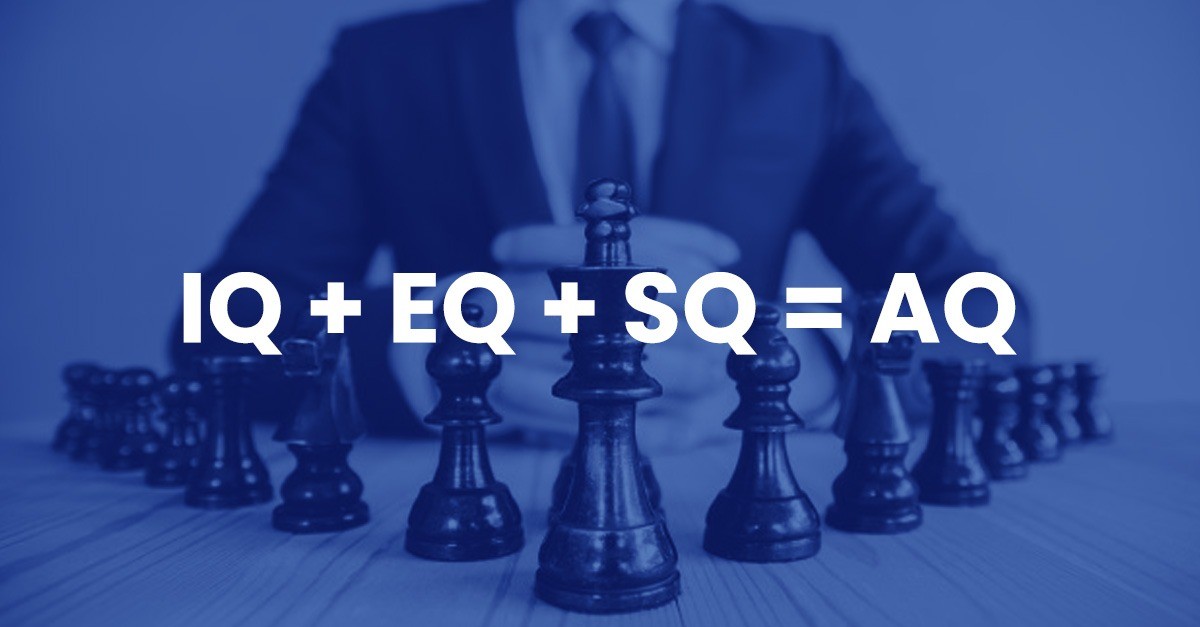“Truly agile companies are twice as likely to deliver top-quartile financial results than an average organization.” says this Accenture report.
In the last few years, several businesses can be seen trying to come to terms with the rising importance of enterprise agility. A lot of time and resources are being spent to make businesses more agile. And they are not wrong in doing so.
With competition rising across industries and the world turning into a global village, disruptions, innovations, and unpredictable market conditions are now an everyday affair.
But while it is not wrong for managers and decision-makers to work towards making their organization and people more agile, enterprise agility, or the modern way of putting it, Agility Quotient (AQ) is an amalgamation of other aspects that are equally critical for business success.
AQ – Where EQ and IQ Meets SQ

Working as an executive and leadership coach over the years, I see Agility Quotient (AQ) as a sweet spot between IQ (Intelligence Quotient), EQ (Emotional Quotient), and SQ (Spiritual Quotient).
Working on these vital quotients is the most effective way for business leaders and decision-makers to make their organizations more agile. So, what do they mean?
Intelligence Quotient (IQ)
A holistic leadership approach requires knowledge, a lot of it. Learning in itself should be a lifelong journey. For entrepreneurs in these unpredictable market conditions, there is no option but to keep learning. It can be learning from mistakes, understanding a new technology or tool, or taking pointers from other successful businesses.
From the leadership perspective, IQ is not really about intelligence. It is about your openness towards acquiring more knowledge. The more you learn, the more you and your organization would be able to upgrade themselves as per the changing times.
Check out this Simon T. Bailey interview, where he talks about professional leadership development and how entrepreneurs can shift their brilliance while sharpening their focus.
Emotional Quotient (EQ)
Peter Salovey and John D. Mayer are considered the founding fathers of EQ for creating the emotional intelligence framework in the 1900s. In 1995, Daniel Goleman then championed this concept in this book Emotional Intelligence. In his world-renowned book What Makes a Leader, he suggests that EQ is an absolute requirement of leadership.
At its core, EQ is all about one’s ability to manage their emotions and those of others around them. As the Corona pandemic has shaken the economic foundation of countries across the world and forced hundreds of businesses to shut down permanently, the sense of fear is rampant.
As a business leader, it is your responsibility to not only keep your emotions in check but also offer the emotional care and support that others around you might need.
Spiritual Quotient (SQ)
Companies like Boeing, Nike, AT&T, and Ford have embraced SQ as a critical component of their managerial vocabulary. Businesses across the world now realize the importance of changing the workplace from a place where people earn money to something that nourishes their souls and encourages their creativity.
In his popular paper ‘A Theory of Human Motivation’ released in 1943, Abraham Maslow suggested that as nations and their people will become more affluent, their spiritual hunger would grow stronger.
As the VUCA world continues with its volatility, uncertainty, complexity, and ambiguity, SQ is something that could add more balance, wisdom, compassion, and meaning to your actions as a business leader.
Agile Leadership for Sustainable Growth
As a business leader, you too might be working towards making your organization and people more agile to keep up with the changing times. But agility is an interdisciplinary concept that abundantly depends on the factors discussed above.
Working on IQ, EQ, and SQ is the most effective way for leaders and managers to improve their AQ. And the best part is, these qualities can be improved with time, effort, and professional intervention.
But how?
That’s something for another day/post.
I’ll cover some amazing tips to increase EQ, IQ, and SQ of an organisation in another post.
In the meantime, what do you think are some of the ways to increase EQ, IQ, SQ, and ultimately the AQ of a leader and a business – do share in the comments.


